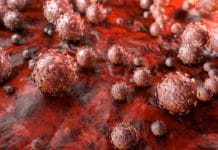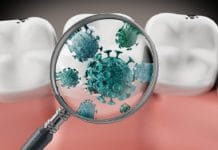My niece has worked at a well-known coffee shop for a long time. I remember that I would pick up my son from school and stop by her store for a visit. It would be after 2:00 pm and I wanted to grab a drink, but I couldn’t drink caffeine that late in my day.
She recommended I try an iced tea called Passion Tango. I fell instantly in love. I have devoured this tea for years at the neighborhood shops and when I travel. Recently, I actually looked up what was in it and come to find out Passion Tea is infused with hibiscus flowers. Aloha!
I began speaking to dental professionals in 2018 about how utilizing dental professionals can be an innovative way to help in the prevention of Alzheimer’s disease (AD). Our knowledge is vast, and we can reach the public in ways other health-care providers may fail. In my research of the disease, the correlation between high blood pressure and Alzheimer’s disease was staggering.
Blood Pressure’s Role in Alzheimer’s
High blood pressure increases your risk of developing the disease by almost 40%. Among women in their 40s with high blood pressure, dementia risk could be increased by as much as 73 percent, and two-thirds of Alzheimer cases are women.1,2 This intrigued me as I take blood pressure every day on every patient. While maybe using that existing protocol, I could somehow make a difference in changing in a small way the grim future for this disease.
Findings from a large study called the SPRINT (systolic blood pressure intervention trial) MIND (memory and cognition in decreased hypertension) trial 3 showed that lowering your blood pressure, say below 120/80, reduces your risk of mild cognitive impairment, the precursor to AD by 17%. Good blood pressure is so important for our vessel health, which in turn is good for our brains. The brain requires a large amount of blood flow, which needs to be precisely controlled to maintain optimal neuronal function.
We have so many patients with high blood pressure; some are on medication, and some are not. Statistics from the American Heart Association estimates that 103 million American adults, or roughly 46 percent of the nation’s adult population, now qualify as having high blood pressure, and 16 percent of them don’t know they have the condition.
We record blood pressure on each patient at every visit. It enables us to have years of data so we can see even the slightest increase that can directly affect not only their overall health but their brain health. We always need more resources to help our patients achieve better health and having something to share with them as a natural way to help reduce perhaps an increase in blood pressure is vital.
That something to share with your patient, my friends, is hibiscus tea.
Benefits of Hibiscus Tea
Hibiscus tea is known as sour tea, but to me, it’s tangier than sour. This tea is used in over ten countries as a normal treatment protocol for hypertension. A study in Nigeria discovered hibiscus tea to be more effective than hydrochlorothiazide (HCTZ) at decreasing blood pressure without the side effect of an electrolyte imbalance.5,6
I do not recommend using tea instead of what a physician recommends. But perhaps hibiscus tea may be a great adjunct. Many patients are trying everything to lower their blood pressure numbers, and what a beautiful, healthy recommendation hibiscus may be. Society is looking for natural alternatives, and we should at least have the knowledge to contribute to different ideas.
Hibiscus tea has been shown to help diabetics increase HDL (good) cholesterol and decrease LDL (bad) cholesterol and triglycerides, which runs directly in line with improving heart health as well.7 It is filled with antioxidants or polyphenols that fight free radical damage helping with oxidative stress caused by poor diet or exposure to dangerous chemicals. Antioxidants work to protect our cells, and hibiscus tea have even more than matcha tea without the caffeine. Antioxidants have been tied to protection against heart disease and cancer, as well as better blood sugar regulation, blood pressure reduction, and have anti-aging properties.
The natural pigment in hibiscus is called anthocyanins – a type of flavonoid similar to the benefits we get from berries, pomegranates, and tart cherries. Oxidative stress is something all too common with our periodontal patients, and couldn’t this be a help for them? What about all of our diabetic or prediabetic patients we see every day.
Drinking hibiscus tea at least once a day may also help fight insulin resistance and help them maintain healthy blood sugar. Blood pressure, oxidative stress, insulin resistance are all contributors to mild cognitive impairment the precursor to dementia and AD. The great news is you don’t have to break the bank buying hibiscus tea either. Most grocery stores are carrying it now. Brew it at home, drink a cup hot or iced, and enjoy. What an easy way to incorporate antioxidants into your diet.
Author’s note: Hibiscus can interact with some medications. Before adding hibiscus tea to your diet, consult your doctor about any pre-existing health condition you may have.
Before you leave, check out the Today’s RDH self-study CE courses. All courses are peer-reviewed and non-sponsored to focus solely on high-quality education. Click here now.
Listen to the Today’s RDH Dental Hygiene Podcast Below:
References
- Gottesman, R.F., Schneider, A.L., Albert, M., et al. Midlife hypertension and 20-year cognitive change: the atherosclerosis risk in communities’ neurocognitive study. JAMA Neurol. 2014: 71(10):1218–1227. DOI:10.1001/jamaneurol.2014.1646 Retrieved from https://www.ncbi.nlm.nih.gov/pubmed/25090106
- Gilsanz, P., Mayeda, E.R., Glymour, M.M., et al. Female sex, early-onset hypertension, and risk of dementia. Neurology. 2017: 89(18):1886–1893. DOI:10.1212/WNL.0000000000004602. Retrieved from https://www.ncbi.nlm.nih.gov/pubmed/28978656
- The SPRINT MIND Investigators for the SPRINT Research Group. Effect of Intensive vs Standard Blood Pressure Control on Probable Dementia: A Randomized Clinical Trial. JAMA. Published online January 28, 2019321(6):553–561. doi:10.1001/jama.2018.21442 Retrieved from https://jamanetwork.com/journals/jama/fullarticle/2723256 https://www.mdedge.com/cardiology/article/193398/hypertension/sprint-mind-published-extension-trial-add-2-years-follow
- Abell, J.G., Kivimäki, M., Dugravot, A., Tabak, A.G., Fayosse, A., Shipley, M., Sabia. S., Singh-Manoux, A. Association between systolic blood pressure and dementia in the Whitehall II cohort study: role of age, duration, and threshold used to define hypertension.European Heart Journal. Sept 2018: 39(33): 3119–3125. Retrieved from https://doi.org/10.1093/eurheartj/ehy288
- Zuccalà, G., Cattel, C., Manes-Gravina, E., et al. Left ventricular dysfunction: a clue to cognitive impairment in older patients with heart failure. Journal of Neurology, Neurosurgery & Psychiatry. 1997: 63:509-512. Retrieved from https://www.ncbi.nlm.nih.gov/pubmed/9343133
- Hopkins, A.L., Lamm, M.G., Funk, J.L., Ritenbaugh, C. Hibiscus sabdariffa L. in the treatment of hypertension and hyperlipidemia: a comprehensive review of animal and human studies.Fitoterapia. 2013: 85:84–94. DOI:10.1016/j.fitote.2013.01.003. Retrieved from https://www.ncbi.nlm.nih.gov/pmc/articles/PMC3593772/
- Nwachukwu, D.C., Aneke, E., Nwachukwu, N.Z., Obika, L., Nwagha, U.I., Eze, A.A. Effect of Hibiscus sabdariffaon blood pressure and electrolyte profile of mild to moderate hypertensive Nigerians: A comparative study with hydrochlorothiazide. Niger J Clin Pract. 2015: 18:762-70. Retrieved from http://www.njcponline.com/text.asp?2015/18/6/762/163278
- Mozaffari-Khosravi, H., Jalali-Khanabadi, B., Afkhami-Ardekani, M., Fatehi, F.The Journal of Alternative and Complementary Medicine. Aug 2009: 15(8)August 13, 2009 http://doi.org/10.1089/acm.2008.0540











